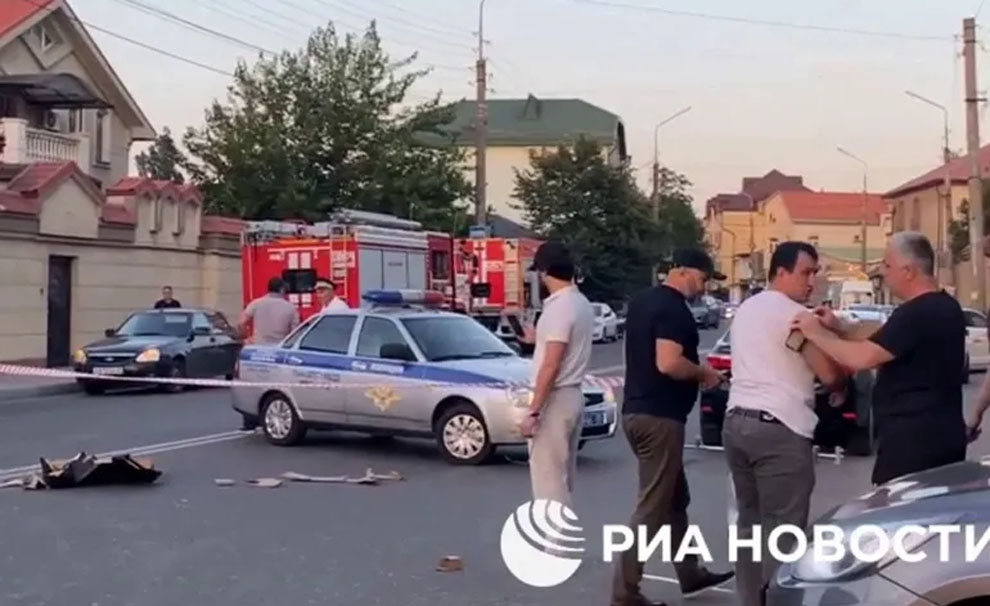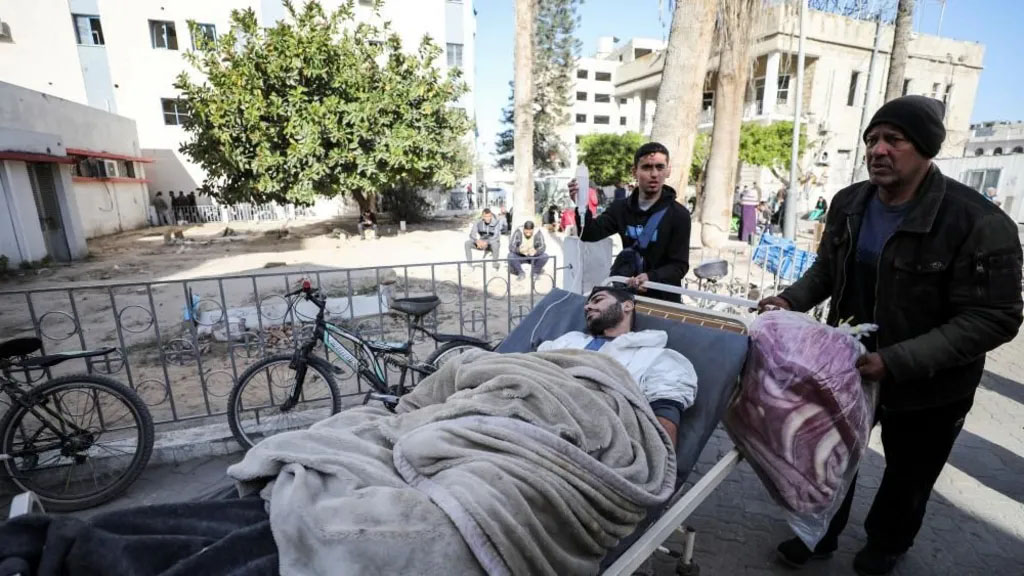International
Priest, 15 police killed in gumnen attacks on Russia’s city

Priest, 15 police killed in gumnen attacks on Russia’s city
Gunmen have attacked churches, a synagogue and a police post in Russia’s North Caucasus region of Dagestan, killing at least 15 police and National Guard officers, several civilians and an Orthodox priest, according to authorities.
At least 12 people were injured in the attacks, which took place in the cities of Derbent and Makhachkala on Sunday, the festival of Pentecost for the Russian Orthodox Church.
Videos posted on social media and shown on Russian TV showed the skies of Derbent, which is home to an ancient Jewish community in the mainly Muslim region, filled with smoke and flames after the synagogue was set on fire.
Places of worship were also attacked in Makhachkala, the capital of Dagestan and its largest city, approximately 125km (78 miles) away, where the police post also came under attack.
Russia’s Investigative Committee said it had opened criminal investigations over “acts of terror” in Dagestan, which neighbours Chechnya and is one of the poorest areas of Russia.
“This evening in the cities of Derbent and Makhachkala armed attacks were carried out on two Orthodox churches, a synagogue and a police checkpoint,” the National Anti-terrorism Committee said in a statement to the RIA Novosti news agency.
“As a result of the terrorist attacks, according to preliminary information, a priest from the Russian Orthodox Church and police officers were killed.”
The Russian Orthodox Church said its archpriest Nikolai Kotelnikov had been “brutally killed” in Derbent.
‘International terrorist organisation’
The attack on the Derbent synagogue took place about 40 minutes before evening prayers were due to start.
READ ALSO:
- Gaza: Netanyahu says war will continue notwithstanding ceasefire deal with Hamas
- Miyetti Allah demands livestock ministry, rejects animal husbandry bill
- HND holders to undergo one-year mandatory training – FG
“The synagogue in Derbent is on fire,” the chairman of the public council of Russia’s Federation of Jewish Communities, Boruch Gorin, wrote on Telegram. “The synagogue in Makhachkala has also been set on fire and burned down.”
The rabbi of Makhachkala, Rami Davidov, later told the state-run RIA Novosti that no one was killed or injured there.
Dagestan’s Ministry of Internal Affairs said 19 people took shelter inside a church in the city before they were led to safety.
Sergei Melikov, the head of the Republic of Dagestan, said the six attackers had been “liquidated”.
The Russian news agency TASS, citing law enforcement agencies, reported that the gunmen were members of “an international terrorist organisation”.
The attackers have not yet been identified.
“Tonight in Derbent and Makhachkala, unknown people made attempts to destabilise the public situation,” Melikov said.
“Dagestan police officers stood in their way. According to preliminary information, there are casualties among them. All services are acting in accordance with the instruction … The identities of the attackers are being established.”
The attacks come three months after some 133 people were killed when gunmen opened fire at a rock concert in the Crocus City Hall on the outskirts of Moscow. Islamic State in Khorasan Province, ISKP (ISIS-K), based in Afghanistan, said it was behind that attack, although Moscow claimed without evidence that Ukraine had a role.
Russia’s FSB security service in April said it had arrested four people in Dagestan on suspicion of involvement in plotting the Crocus City Hall attack.
In an update on the events of June 23, the Washington, DC-based Institute for the Study of War (ISW), noted that the Russian branch of ISKP’s Al-Azaim Media had praised “their brothers from the Caucasus” for demonstrating their capabilities in Dagestan.
“Al-Azaim did not claim credit for the attack itself, notably, and the reference to the Caucasus strongly suggests that Wilayat Kavkaz [ISIL’s northern Caucasus branch] is responsible for the attack,” ISW said.
Daniel Hawkins, reporting for Al Jazeera from Moscow, noted that Dagestan had seen unrest in the 1990s and early 2000s.
“Violence there, as the years have gone on, has died down,” Hawkins said, explaining that the region never saw the kind of conflict that engulfed the neighbouring Russian republic of Chechnya, where Russian forces fought two brutal wars during the same period.
“This sort of attack that’s coordinated and has targeted civilian religious infrastructure is very unusual and will no doubt be shocking to Russians across the country,” Hawkins said.
In October last year, hundreds of people stormed the airport in Makhachkala over a flight from Israel landing there. At least 60 people were arrested after they broke through security to the runway and inundated the area around the aircraft shouting anti-Jewish slogans.
Priest, 15 police killed in gumnen attacks on Russia’s city
International
Israel ejects Gaza hospital, detains medical personnel

Israel ejects Gaza hospital, detains medical personnel
The last major functioning hospital in northern Gaza was forcibly evacuated by the Israeli military on Friday after dozens of people were reportedly killed in Israeli strikes targeting the area.
Medical staff, including the director of the Kamal Adwan Hospital, have also been detained, Gaza health officials said on Saturday.
The hospital director, Dr Hussam Abu Safiya, was among the first to report that about 50 people had been killed in Israeli air strikes targeting the vicinity of the hospital on Friday.
The IDF had said it was carrying out an operation in the area, alleging the hospital was a “Hamas terrorist stronghold”.
On Friday, patients at the hospital were forcibly moved to the nearby Indonesian Hospital which doctors warn is damaged and unsuitable due to a lack of power generators and water.
Eid Sabbah, head of the nursing department at Kamal Adwan, told the BBC the military had ordered the evacuation around 07:00 on Friday, giving the hospital about 15 minutes to move patients and staff into the courtyard.
Israeli troops then entered the hospital and removed the remaining patients, he said.
READ ALSO:
- We’re not aware of VeryDarkMan’s missing N180m — Police
- Trump asks Supreme Court to suspend law for TikTok ban
- Romeo and Juliet actress Olivia Hussey dies at 73
The IDF said it had “facilitated the secure evacuation of civilians, patients and medical personnel” before beginning the operation.
Seriously ill patients were moved to the nearby Indonesian Hospital, itself evacuated earlier in the week, which medics have described as non-functional.
“You can’t call it a hospital, it’s more of a shelter. It’s not equipped for patients,” Gaza’s deputy minister of health, Dr Abu-Al Rish, told the BBC on Friday.
Dr Sabbah, from Kamal Adwan Hospital, said: “It’s dangerous because there are patients in the ICU department in a coma and in need of ventilation machines and moving them will put them in danger.”
He had said critically ill patients needed to be moved in specialised vehicles.
The World Health Organization said the raid “has put this last major health facility in north Gaza out of service”.
“Initial reports indicate that some key departments were severely burnt and destroyed during the raid,” it posted on X on Friday.
Nadav Shoshani, international spokesman for the Israel Defense Forces (IDF), said in a post on Friday evening on X that a “small fire broke out in an empty building inside the hospital that is under control”.
This was when IDF troops were not inside the hospital, he said, adding that “after preliminary examination, no connection was found between IDF activity to the fire”.
The director of Kamal Adwan hospital had said on Friday that approximately 50 people had been killed, including five medical staff, in a series of Israeli air strikes targeting the vicinity of the hospital.
READ ALSO:
- Niger’s president faces fire at home over attack on Nigeria
- Israel attacks: UN warns humanitarian disaster in Yemen may get worse
- Wike: My fallout with Secondus was his opposition to Fubara
The statement from Dr Hussam Abu Safiya said a building opposite the hospital was targeted by Israeli warplanes, leading to the death of a paediatrician and a lab technician, as well as their families.
He said a third staff member who worked as a maintenance technician was targeted and killed as he rushed to the scene of the first strike.
Two of the hospital’s paramedics were 500m (1,640ft) away from the hospital when they were targeted and killed by another strike, the statement continued, with their bodies remaining in the street with no-one able to reach them.
The Israeli military said on Friday morning that it was “unaware of strikes in the area of Kamal Adwan hospital” and was looking into the reports that staff had been killed.
Kamal Adwan hospital in Beit Lahia has been under a tightening Israeli blockade imposed on parts of northern Gaza since October, when the military said it had launched an offensive to stop Hamas from regrouping there.
The UN has said the area is under a “near-total siege” as the Israeli military heavily restricts access of aid deliveries to an area where an estimated 10,000 to 15,000 people remain.
In recent days, the hospital’s administrators have issued desperate pleas appealing to be protected, as they say the facility has become a regular target for Israeli shelling and explosives.
Oxfam said that attempts by aid agencies to deliver supplies to the area since October had been unsuccessful because of “deliberate delays and systematic obstructions” by the Israeli military.
Additional reporting by Shaimaa Khalil
Israel ejects Gaza hospital, detains medical personnel
BBC
International
Trump asks Supreme Court to suspend law for TikTok ban

Trump asks Supreme Court to suspend law for TikTok ban
US President-elect Donald Trump filed a brief Friday urging the Supreme Court to pause a law that would ban TikTok the day before his January 20 inauguration if it is not sold by its Chinese owner ByteDance.
“In light of the novelty and difficulty of this case, the court should consider staying the statutory deadline to grant more breathing space to address these issues,” Trump’s legal team wrote, to give him “the opportunity to pursue a political resolution.”
Trump was fiercely opposed to TikTok during his 2017-21 first term, and tried in vain to ban the video app on national security grounds.
The Republican voiced concerns — echoed by political rivals — that the Chinese government might tap into US TikTok users’ data or manipulate what they see on the platform.
US officials had also voiced alarm over the popularity of the video-sharing app with young people, alleging that its parent company is subservient to Beijing and that the app is used to spread propaganda, claims denied by the company and the Chinese government.
Trump called for a US company to buy TikTok, with the government sharing in the sale price, and his successor Joe Biden went one stage further — signing a law to ban the app for the same reasons.
– Reversing course –
Trump has now, however, reversed course.
At a press conference last week, Trump said he has “a warm spot” for TikTok and that his administration would take a look at the app and the potential ban.
READ ALSO:
- Romeo and Juliet actress Olivia Hussey dies at 73
- Niger’s president faces fire at home over attack on Nigeria
- Israel attacks: UN warns humanitarian disaster in Yemen may get worse
Earlier this month, the president-elect met with TikTok CEO Shou Zi Chew at his Mar-a-Lago residence in Florida.
Recently, Trump told Bloomberg he had changed his mind about the app: “Now (that) I’m thinking about it, I’m for TikTok, because you need competition.”
“If you don’t have TikTok, you have Facebook and Instagram — and that’s, you know, that’s Zuckerberg.”
International
Romeo and Juliet actress Olivia Hussey dies at 73

Romeo and Juliet actress Olivia Hussey dies at 73
Actress Olivia Hussey, who shot to international prominence as a teenager for her role in the acclaimed 1968 film version of Romeo and Juliet, has died aged 73.
The Argentinian-born actress, who grew up in London, died on Friday surrounded by her loved ones, a statement posted on her Instagram said.
Hussey won the best new actress Golden Globe for her part as Juliet, but decades later she sued Paramount Pictures for sexual abuse as she was aged just 15 when she filmed the movie’s nude scene.
Her other most notable screen role was as Mary, mother of Jesus, in 1977 TV miniseries Jesus of Nazareth.
“As we grieve this immense loss, we also celebrate Olivia’s enduring impact on our lives and the industry,” the statement said.
Hussey was born in Buenos Aires, Argentina, in 1951, before moving to London aged seven and studying at the Italia Conti Academy drama school.

1968’s Romeo and Juliet was nominated for best picture and director Oscars
She was 15 when Romeo and Juliet director Franco Zeffirelli discovered her onstage, playing opposite Vanessa Redgrave in the play The Prime of Miss Joan Brodie
READ ALSO:
- Niger’s president faces fire at home over attack on Nigeria
- Israel attacks: UN warns humanitarian disaster in Yemen may get worse
- Wike: My fallout with Secondus was his opposition to Fubara
Zeffirelli was looking for someone who was young enough to be a convincing Juliet in what he intended to be the definitive cinematic version of the Shakespeare play.
He cast Hussey alongisde British 16-year-old Leonard Whiting as Romeo in the film.
The film was nominated for an Oscar for best picture and director. Hussey missed out on an Oscar nomination herself in a strong year in which Barbra Streisand won the main award for Funny Girl.
But at that year’s Golden Globes Hussey won the award for best new star.
Decades later, she and Whiting sued Paramount Pictures alleging Zeffirelli – who died in 2019 – had encouraged them to film nude scenes despite previous assurances they would not have to.
The pair sought damages of more than $500m (£417m), based on suffering they said they had experienced and the revenue brought in by the film since its release.
But last year a judge dismissed the case, finding the scene was not “sufficiently sexually suggestive”.
In 1977, Hussey had reunited with Zeffirelli for Jesus of Nazareth to play the Virgin Mary, before appearing in Death on the Nile a year later based on Agatha Christie’s novel.
Her roles in early slasher film Black Christmas (1974) and TV film Psycho IV: The Beginning earned her recognition as a scream queen. In the latter, she p[layed Norman Bates’s mother in a prequel storyline.
In later years she also took on work as a voice actress, appearing frequently in video games.
But she did have one final reunion with her former Romeo – as she and Whiting appeared together in the 2015 British film Social Suicide, which was loosely based on Romeo and Juliet, albeit set in the social media era.
Romeo and Juliet actress Olivia Hussey dies at 73
BBC
-

 Business2 days ago
Business2 days agoBe creative, monarch, others challenge Muslim professionals on economic revival
-

 Auto1 day ago
Auto1 day agoLSM MD extols founder’s qualities after latter posthumous industry award
-

 Entertainment1 day ago
Entertainment1 day agoMultiChoice announces free access to all DSTV channels for 3 days
-

 metro2 days ago
metro2 days agoJigawa State governor loses son 24 hours after mother’s death
-

 metro1 day ago
metro1 day agoHeavy security in Ilesa as ex-Osun deputy gov emerges new Owa-Obokun
-

 News23 hours ago
News23 hours agoNigeria Customs Service begins 2025 recruitment [How to apply]
-

 metro23 hours ago
metro23 hours agoLagos Imam to Tinubu: You haven’t disappointed us
-

 metro1 day ago
metro1 day agoDangote, Tinubu, Lookman named among 100 most influential Africans in 2024 (Full list)

